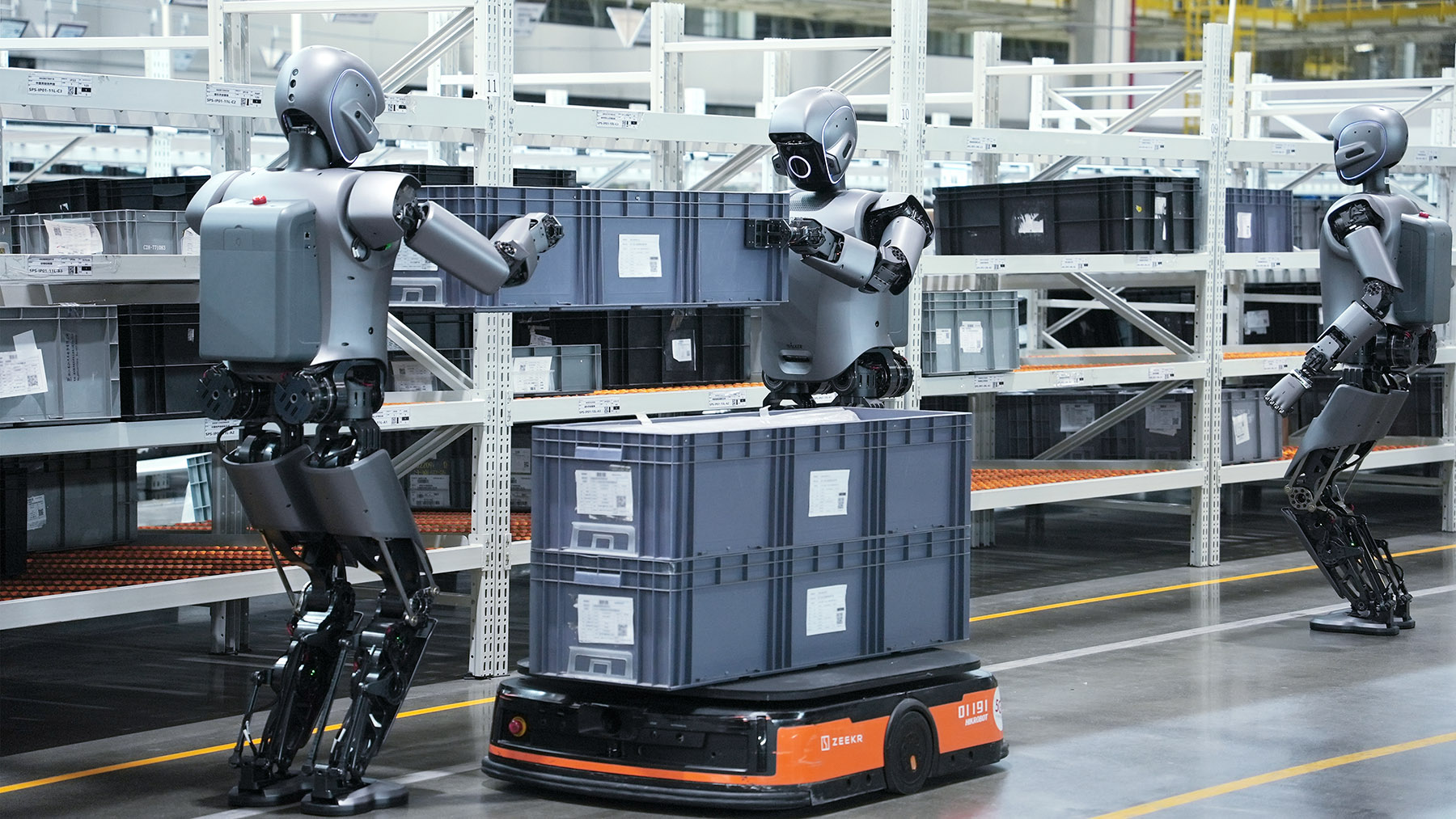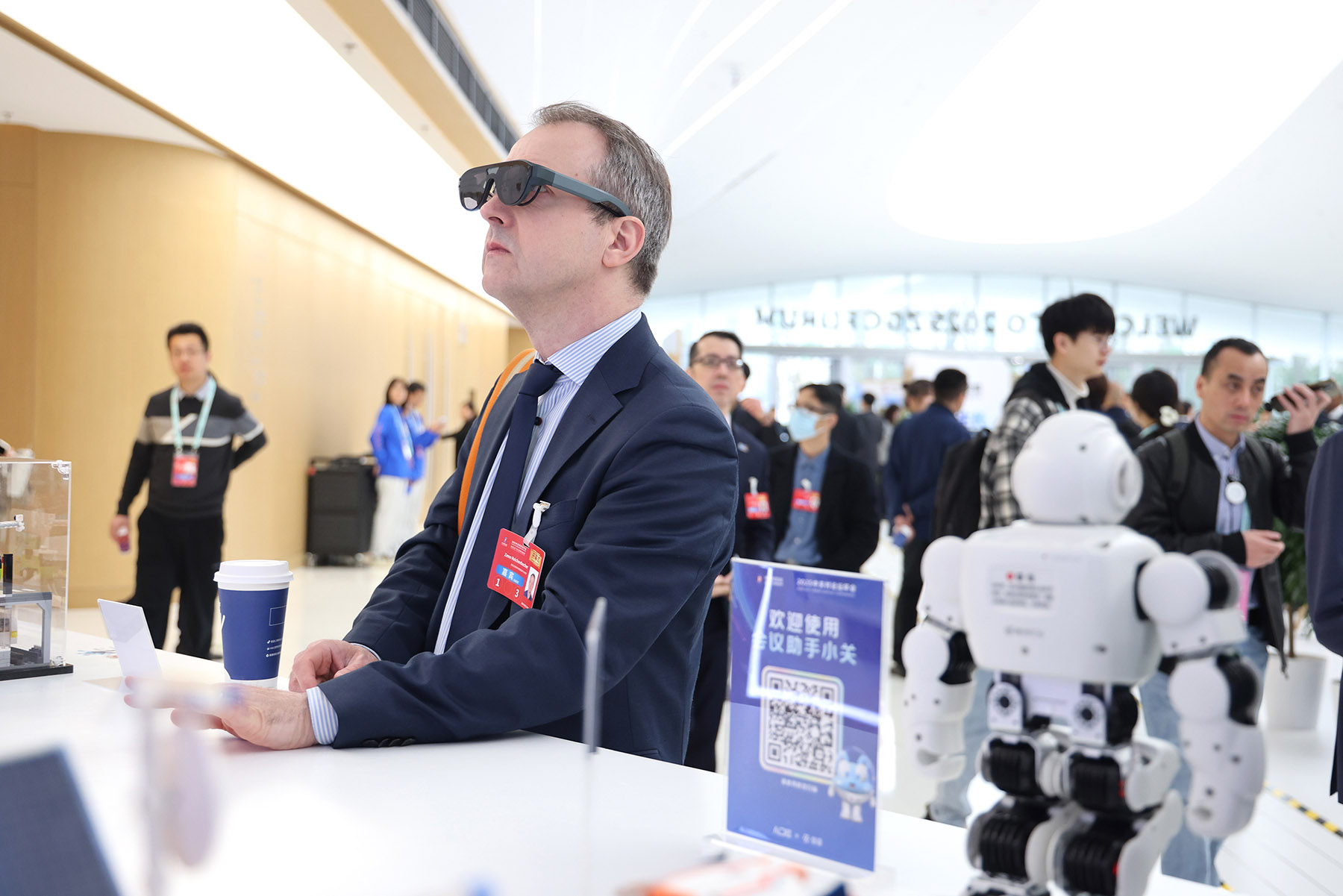China fostering own vision of development through reliable, efficient application of artificial intelligence tools across industry sectors

Delegates and visitors to the Zhongguancun Forum, a key technology event held in Beijing recently, were in for a surprise when they arrived at the venue late last month.
As they stepped in, they were greeted not by ushers in uniform, but by a coordinated team of robots that mimicked human expressions, answered queries and translated conversations in real time.
In the shadow of a series of bullying (tariffs) imposed by the Trump administration earlier this month, China is doubling down on what may be its most potent counterstrike: AI. From breakthrough chips to frontier models rivaling the West's best to humanoid robots, China's AI breakthroughs could stand out to be a potential game changer, industry experts said.
Elsewhere at the venue, a robot with a friendly voice and precise movements guided guests to a coffee corner where a robotic barista brewed fresh beverages. And, once the coffee was ready, another humanoid robot delivered it directly to the guest.
READ MORE: AI tech prowess attracting investors
While other robots played chess with visitors or displayed their brush calligraphy skills with serene focus, some robotic dogs darted easily through the crowd of visitors.
This was just one of several events held last month where artificial intelligence took center stage.
In March, China saw a series of major events, including the two sessions, or the annual gatherings of the country's top legislature and political advisory body; the Zhongguancun Forum; and the China Development Forum in Beijing, as well as the Boao Forum for Asia in Hainan province.
In fact, several AI-related panel discussions at the Boao and Zhongguancun forums saw packed houses, with attendees filling up every seat and some even standing to hear out the participants.
This overwhelming interest in AI mirrors the prominence of the nascent sector across the nation, displaying a vivid picture of China's technological future.
Industry experts said China is fostering its own vision for the development of AI through the reliable and efficient application of AI tools across a wide range of industries, a path that differs wisely from that of the United States.
Turing Award winner Joseph Sifakis said at the Zhongguancun Forum that China is crafting its own AI vision, distinct from that of the US.
"China has a solid and extensive industrial base and a unified domestic market. This enables the country to develop more reliable AI solutions that better align with the needs of the real economy, especially in the long-awaited transition to autonomous driving," he said.
Sifakis noted that China's strong industrial foundation, in particular, gives it an edge while industries such as self-driving vehicles, smart cities, smart factories and intelligent farms present more opportunities. "If developed well, (all these) will give China a dominant position in industrial AI," he said.

Kai-Fu Lee, a prominent AI expert and chairman and CEO of investment company Sinovation Ventures, said China has reached its "DeepSeek moment". He predicted that 2025 would mark a breakout year for AI applications and large-scale model deployment in China.
Lee recalled that about nine months ago, he had expressed frustration over China's lack of a "ChatGPT moment", as promising Chinese AI models at the time failed to stand out and spark nationwide adoption.
"However, DeepSeek has changed that landscape. Its success has awakened the Chinese market, ushering in a new AI era for the country," he said.
According to Lee, DeepSeek's rise proves that "closed-source AI has no future", and only open-source development will drive greater progress.
"As AI scaling laws shift from the pretraining stage to the inference stage, AI applications will accelerate exponentially this year," he said.
Scaling laws describe how the performance of AI systems improves as the size of the training data, model parameters or computational resources increase.
Kuang Ziping, founding partner of Qiming Venture Partners, a toptier Chinese venture capital firm, echoed that sentiment.
While the first generation of AI saw fragmented innovation, the second generation — dubbed "AI 2.0" — will be built on infrastructure, scalability and real-world application, he said.
"There's still a huge gap in foundational infrastructure investment," Kuang said. "But the application layer is poised for explosive growth."
From smart education and autonomous driving to embodied intelligence and hardware, he said the sectors that successfully integrate AI will define the future.
Zhu Xiaohu, managing partner at GSR Ventures, emphasized that generative AI must prioritize one principle above all — application is king.
Startups, he said, must embrace open-source ecosystems and rapidly iterate their products in vertical industries. The most effective businesses, he predicted, will not rely on AI alone, but on "AI plus human" hybrid models that combine intelligence with nuanced delivery capabilities.
As excitement around AI innovation builds in China, it also collides with geopolitical headwinds, especially after the nation, a major trading partner of the US, was hit with several rounds of so-called reciprocal tariffs since April, in addition to a 20 percent tariff imposed earlier this year.

Last month, the US also added dozens of additional Chinese entities, including the Beijing Academy of Artificial Intelligence and tech firm Inspur Group, to its export restrictions list.
But, the world is big enough for hundreds of countries, including the US and China, to codevelop AI, and Washington's sanctions on high-tech sectors will only steel Beijing's resolve to drive homegrown innovations, said industry experts and company executives.
During a panel discussion at Boao Forum for Asia, Zeng Yi, a member of the United Nations' high-level advisory body on AI and a researcher at the Chinese Academy of Sciences' Institute of Automation, said: "The future of AI is not decided by a handful of countries, but by nearly 200 countries and regions. The world is big enough to embrace both the US and China to codevelop AI."
Zheng Yongnian, dean of the School of Public Policy at the Chinese University of Hong Kong (Shenzhen), criticized as "unwise "the inclusion of Chinese companies in restrictive measures aimed at hindering China's AI progress.
"China possesses significant advantages in application scenarios, with the government actively promoting the AI Plus strategy to expedite technological implementation. US sanctions on technologies have, paradoxically, spurred China to intensify investments in these areas and foster indigenous innovation," Zheng said.
"If China's AI technologies continue to evolve at the current pace, the US might find itself relying on China's original innovations in certain sectors within 10 to 15 years," he added.
Carl Fey, a professor of strategy at BI Norwegian Business School, said that while US tech restrictions may cause short-term pain for China, they will ultimately compel the latter to fortify its technological base and sharpen its global competitiveness.
Fey warned that measures like tariffs and export bans not only slow global tech progress, but also backfire by accelerating domestic innovation.
A group of experts cited Deep-Seek as a case in point — a low-cost, open-source AI model that is transforming the industry landscape. DeepSeek's accessible architecture enables rapid deployment, and widespread use may reshape the AI future globally, a vision where AI, like water or electricity, becomes a basic utility available to everyone.
Jiang Xiaojuan, a professor at the University of Chinese Academy of Social Sciences, said that Deep-Seek is breaking monopolies and ushering in a new era of vigorous competition, converting technical know-how into industrial might.
"In a competitive market, these challenges will naturally be resolved by the forces of the market itself," Jiang said.
ALSO READ: Robotics sector goes full throttle for self-reliance despite headwinds
Gao Xuefeng, founder and CEO of AI data infrastructure company Fabarta, said that after DeepSeek's breakthrough, many Chinese companies no longer hesitate to invest in AI.
"Every few months, new technological advancements emerge. Companies can't afford to wait; they must integrate AI into their business and industry now," Gao said, adding that every sector in China can be re-imagined through AI in the coming years.
Amid rising AI enthusiasm, Wang Zhongyuan, head of the Beijing Academy of Artificial Intelligence, a leading nonprofit AI institute, said that DeepSeek has indeed delivered impressive results, proving that China can train large-scale AI models parallel to ChatGPT 4 despite limited computing power.
Regarding artificial general intelligence, in which an AI system can match or exceed the cognitive abilities of humans in any real-world task, Wang said that the industry is still far from achieving such capabilities. "I think we are still at least five to 10 years, or even longer, from reaching that level," he added.
chengyu@chinadaily.com.cn


